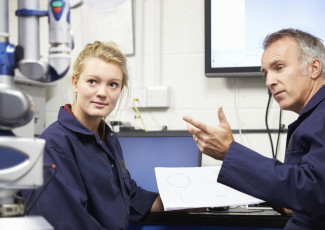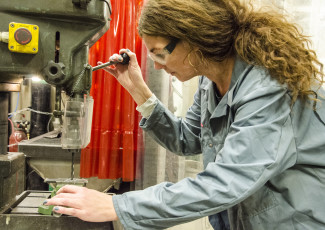Unlocking the Power of Digital Badges in Manufacturing
By Heather Boerner
August 7, 2015
The Colorado Community College System wants to help employers understand what skills students really have.
Jerry Migler, vice president of academic affairs and provost for the Colorado Community College System (CCCS), is on a mission to bridge the skills gap. To do that, he wants to bring a new tool to colleges and industry: badges. The recipients of these badges? Students who work their way through the system’s advanced manufacturing-training programs.
“These badges will tell employers that, if a student took a certain course, they picked up these unique skills,” he says. “And that is going to help employers who are looking at a resume — whether that’s on LinkedIn or another digital platform — ascertain not only that the student has achieved certain certificates or degrees but also a specific skill set.”
A pilot collaboration
The new digital badge program, a partnership between LinkedIn, the college system, the Colorado Advanced Manufacturing Alliance and the governor’s office, is set to pilot this year, with the first badges designed to highlight benchmarks of student learning within a given course.
Right now, the program is at the “proof of concept” stage, Migler says. But he hopes it will provide a template for bringing college-industry partnerships to the digital world.
Real-world skills, digital badges
Since digital badges emerged a few years ago, as a way to reward training, college leaders have been trying to figure out how to make the badges work for students and industry. In many cases, digital badges are placed on hiring sites, such as LinkedIn, and, when clicked, direct hiring managers to specific data about what the badges represent.
To make the badges useful in the real world, CCCS plans to take this concept one step further by linking digital badges to assessment data that both industry and the college consider robust. So instead of simply telling an employer that a student completed an introductory welding class, for instance, the system would provide different badges for different welding categories, to allow employers to more quickly determine whether a job candidate has the exact skills they need.
“Employers told us they needed more information than just whether a student has participated in a course,” Migler says. “This badge will convey the skill set the student has, so that the employer and the student are also aware of the assessment that went into it.”
A two-step implementation process
In other words, it’s not just about the badge; it’s about the database behind it. To that end, CCCS is working to develop the infrastructure and determine at which point a badge is warranted.
The plan must clear two big hurdles before it’s operational: The first is to set up the database and infrastructure. The second is to apply those metrics to its established manufacturing curriculum in order to identify the “low-hanging fruit” that obviously calls for badges. Again, that idea of achieving proficiency in a certain type of welding is an obvious place for a badge.
The question, asks Migler: “What are the logical areas we can document as badges?”
Listening to industry
But CCCS won’t be making those decisions internally. The local manufacturing association will help the college align the skills achieved with the skills needed in the marketplace, to create badges relevant to hiring managers.
“The most important takeaway so far, and it seems like a logical one, is that you have to have an individual on staff who is working directly and collaboratively with industry,” he says. “That’s important, because badges won’t reach their potential if hiring managers don’t know what they mean.”
Future plans
For now, Migler is keeping plans simple. Initially, badges will be awarded only at the colleges. But if the pilot is successful, he can see the assessment-based badges expanding in many directions. He’d love to see the badges automatically affixed to e-transcripts. He would like to find a way for local companies to assess and award badges, too.
Most exciting, he can imagine a way in which the badges facilitate prior learning assessments. He can imagine a world in which a worker looking to top off his skills completes an assessment and receives badges for prior expertise.
“If we can cooperatively identify specific competencies and skill sets that one can earn in our programs and also on the job, incumbent workers can earn badges before arriving on our campuses,” he says. “That way, if a worker would like to come back for additional skills at the community college’s manufacturing program, they can bring a badge, and we can match those with our curriculum.”








